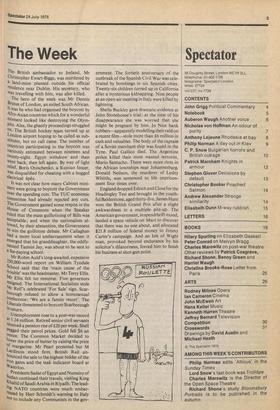The Week
The British ambassador to Ireland, Mr Christopher Ewart-Biggs, was murdered by a land-mine planted outside his official residence near Dublin. His secretary, who Was travelling with him, was also killed.
The hero of the week was Mr Dennis Brutus of London, an exiled South African. It was he who had organised the boycott by Afro-Asian countries which for a wonderful moment looked like destroying the OlymPies. Alas, the ghastly proceedings struggled on, The British hockey team turned up at London airport hoping to be called as substitutes, but no call came. The number of countries participating in the boycott was variously estimated between nineteen and twenty-eight. Egypt withdrew and then went back, then left again. By way of light relief, Boris Onischenko, a Russian fencer, Was disqualified for cheating with a bugged electrical epee.
It was not clear how many Cabinet ministers were going to boycott the Government over the spending cuts. The TUC economic Committee had already rejected any cuts. The Government gained some respite in the House of Commons when the Speaker ruled that the mass guillotining of Bills was acceptable; and when the nationalists allowed, by their abstention, the Government to win the guillotine debate. Mr Callaghan had a more local embarrassment when it emerged that his granddaughter, the oddlynamed Tamsin Jay, was about to be sent to a fee-paying school.
Mr Robin Auld's long-awaited, expensive 250,000-word report on William Tyndale School said that the 'main cause of the trouble was the headmaster, Mr Terry Ellis. Mr Ellis felt no remorse. Five governors resigned. The International Socialists stole Mr ReIf's celebrated For Sale' sign. Scarborough refused to allow a homosexual Conference: 'We are a family resort'. The Liberals threatened to boycott Scarborough in return.
Unemployment rose to a post-war record at 1.24 million. Retired senior civil servants received a pension rise of £20 per week. Shell Pegged their petrol prices. Gold fell $6 art ounce. The Common Market decided to l°wer the price of butter by raising the price °f margarine. Mr Peart protested but M Lardinois stood firm. British Rail announced the sale to the highest bidder of the iron gates and the teak indicator board at Waterloo.
Presidents Sadat of Egypt and Numeiry of Sudan continued their travels, visiting King
halid of Saudi Arabia in Riyadh. The leading NATO countries were much embarrassed by Herr Schmidt's warning to Italy riot to include any Communists in the gov
ernment. The fortieth anniversary of the outbreak of the Spanish Civil War was celebrated by bombings in six Spanish cities. Twenty-six children turned up in California after a mysterious kidnapping. Nine people at an open-air meeting in Italy were killed by lightning.
Sheila Buckley gave dramatic evidence at John Stonehouse's trial : at the time of his disappearance she was worried that she might be pregnant by him. In Nice bank robbers—apparently modelling their raid on a recent film—stole more than £6 million in cash and valuables. The body of the captain of a Soviet merchant ship was found in the Tyne. Paul Gallico died. The Argentine police killed their most wanted terrorist, Mario Santucho. There were more riots in the African townships near Johannesburg. Donald Neilson, the murderer of Lesley Whittle, was sentenced to life imprisonment four times over.
England dropped Edrich and Close for the Headingley Test and brought in the youthful Balderstone, aged thirty-five. James Hunt won the British Grand Prix after a slight awkwardness in a multiple pile-up. The American government, in spendthrift mood, landed a space vehicle on Mars to discover that there was no one about, and allocated $21.8 million of federal money to Jimmy Carter's campaign. And an Isle of Wight man, provoked beyond endurance by his solicitor's dilatoriness, forced him to finish his business at shot-gun point.


































 Previous page
Previous page